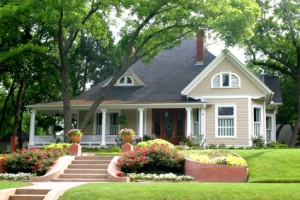Return on Investment: Home Improvement Lists Should Include Landscaping
With real estate values down across the U.S., it is important for homeowners to do what they can to try to improve property values, and the effect of trees on property values is often overlooked. Most articles that focus on the return on investment of home improvements list kitchens and bathrooms. Although improving these areas of your home can yield good returns on investment, these improvements can also be quite costly and, in today’s market, the return may not be as great as it once was.
The Value of a Tree in Your Yard
Your next home improvement project may be as simple as planting a tree. What’s the best return on investment for home improvements that increase your home’s value? What are some of the common characteristics of old, wealthy neighborhoods? Think about it. Most of them have big, old trees! Plant a tree in your yard. The value of a tree in your yard will increase as it grows.
If you will be in your home for a few years, plant a tree in your yard in the eight to 10 foot range. The cost of a tree this size should be in the $100 to $150 range, depending on species. If you are planting something more sought after, like Japanese maples, expect to pay more, but the value of these trees also increases more as they mature. The Council of Tree and Landscape Appraisers states that “a mature tree can often have an appraised value of $1,000 and $10,000.” Planting a tree just may yield the best return on investment. And a home improvement project this easy can’t be beat. Dig a hole, twice the diameter of the tree’s root ball, plant your tree, keep it watered until established, and watch as the value of the tree in your yard grows along with the value of your home.
Effect of Trees on Property Value
The value of a tree in your yard can improve your property value more than you may think. The Arbor Day Foundation cites some of the following effects of trees on property values:
- The effect of trees on property value. Landscaping can add approximately 10 to 20 percent more value to a property – especially landscaping that incorporates mature trees. Commercial areas with trees also attract more customers (and they stay longer and spend more money), and apartments with trees have reduced tenant turnover.
- The effect of trees on resale value. A well-chosen tree adds curb appeal and makes the home appear established within its environment. According to the Arbor Day Foundation’s research, “83 percent of realtors® believe that mature trees have a ‘strong or moderate impact’ on the salability of homes listed for under $150,000; on homes over $250,000, this perception increases to 98 percent.”
- The effect of trees on energy efficiency. Depending on how your home is sited on your property, trees can provide shade during the heat of summer or protect your home from the winds in winter. This effect of trees can cut cooling and heating costs. According to the U.S. Forest Service, “trees properly placed around buildings can reduce air conditioning needs by 30 percent and can save 20 to 50 percent in energy used for heating.” If you’re selling your home, this effect of trees on your home could be a real selling point when talking to potential homebuyers.
- The effect of trees on the senses. Whether it’s a tree’s first blossoms of spring or the vibrant reds, oranges, and golds of fall, trees usher in the seasons and announce their passing. Even the bare branches and bark of deciduous trees can be stunning against a stark winter landscape or dusted with snow. Don’t discount the effect a beautiful tree could have in winning over the heart of a potential homebuyer.
- The value of trees for the good of the planet. If you’re not convinced yet of the value of trees in your yard, consider this. Trees do more than provide decoration. As we learned in elementary school, trees absorb carbon dioxide and release oxygen, which helps reduce the impacts of fossil fuel use and keep the planet in balance. The U.S. Department of Agriculture estimates that “the net cooling effect of a young, healthy tree is equivalent to ten room-size air conditioners operating 20 hours a day.” In addition to this effect, tree roots also reduce soil erosion and storm runoff. These days, educated homebuyers and gardeners are interested in simple strategies to save energy and improve water quality. If you’ve invested time and energy to plant some trees and improve your landscape, the value of a tree in your yard will earn its weight when it comes to winning over potential homebuyers who care about sustainability.
- The effect of trees on your mood. Communities with more trees report lower crime rates and lower levels of anxiety. In one study from Texas A&M University, looking at trees reduced stress within five minutes, as indicated by changes in blood pressure and muscle tension. Communities with lower levels of anxiety and lower crime rates also tend to have higher property values.
- The effect of trees on privacy. A well-sited tree can screen a house from a busy road or a noisy neighbor. The effect of mature trees can create an extension of your home and provide an additional, outdoor room where street noise and the visual impacts of other houses are minimized.
In combination, the effects of trees on property value listed above can provide substantial return on investment for a relatively low-cost home improvement project. Never underestimate the value of a tree in your yard.

